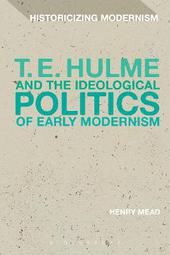
|
T. E. Hulme and the Ideological Politics of Early Modernism
Hardback
Main Details
| Title |
T. E. Hulme and the Ideological Politics of Early Modernism
|
| Authors and Contributors |
By (author) Henry Mead
|
| Series | Historicizing Modernism |
|---|
| Physical Properties |
| Format:Hardback | | Pages:288 | | Dimensions(mm): Height 234,Width 156 |
|
| Category/Genre | Literary studies - from c 1900 - |
|---|
| ISBN/Barcode |
9781472582027
|
| Classifications | Dewey:828.91209 |
|---|
| Audience | | Tertiary Education (US: College) | |
|---|
| Illustrations |
3 illustrations
|
|
Publishing Details |
| Publisher |
Bloomsbury Publishing PLC
|
| Imprint |
Bloomsbury Academic
|
| Publication Date |
27 August 2015 |
| Publication Country |
United Kingdom
|
Description
Drawing on a range of archival materials, this book explores the writing career of the poet, philosopher, art critic, and political commentator T.E. Hulme, a key figure in British modernism. T.E. Hulme and the Ideological Politics of Early Modernism reveals for the first time the full extent of Hulme's relationship with New Age, a leading radical journal before the Great War, focussing particularly on his exchange of ideas with its editor, A.R. Orage. Through a ground-breaking account of Hulme's reading in continental literature, and his combative exchanges amongst the bohemian networks of Edwardian London, Mead shows how 'the strange death of Liberal England' coincided with Hulme's emergence as what T.S. Eliot called 'the forerunner of... the twentieth century mind'. Tracing his debts to French Symbolism, evolutionary psychology, Neo-Royalism, and philosophical pragmatism, the book shows how Hulme combined anarchist and conservative impulses in his journey towards a 'religious attitude'. The result is a nuanced account of Hulme's ideological politics, complicating the received view of his work as proto-fascist.
Author Biography
Henry Mead is a Research Associate at Teesside University, UK, and Bergen University, Norway. He is the co-editor (with Matthew Feldman and Erik Tonning) of Broadcasting in the Modernist Era (Bloomsbury, 2013).
ReviewsMeticulously researched ... This is the fullest account yet of Hulme's intellectual engagement with his multiple contexts. * Times Literary Supplement * Admirers of Hulme will rejoice at Mead's scrupulous reconstruction of this influential modernist's thinking ... T. E. Hulme and the Ideological Politics of Early Modernism is modernist cultural history at its finest, and Mead has given us a book to which Hulme scholars will no doubt refer for many years to come. * Make It New (the periodical of the Ezra Pound Society) * The breadth of Mead's scope makes this an invaluable study for anyone attempting to understand the problems of modernism, either in its infancy or as it began to be replaced by newer attitudes and thoughts in a much-altered world. Part of the "Historicizing Modernism" series, this book helps readers do exactly that. Summing Up: Recommended. Upper-division undergraduates through faculty; general readers. -- A. J. Barlow, New York City College of Technology (CUNY), USA * CHOICE * This is a thorough and well-argued account which represents an undoubtedly useful further step on the ongoing reappraisal of Hulme's contribution to the modernist project. * The Year's Work in English Studies * Mead's patient scrutiny ... offers a great deal of welcome clarification. * Marx & Philosophy Review of Books * The attention paid to Hulme's complex identity is important, and as a result of reading this book, scholars will be able to more fully integrate the detailed analysis of Hulme into their narratives about modernism. * English Literature in Transition * Meticulous attention to detail ... A timely and valuable contribution to our understanding of both Hulme's ideas and the political discussions that fed into the various "modernisms" which emerged in the first few decades of the twentieth century. * English Studies * [A] detailed study ... [The] extrication of multiple strands of thought is one of the most worthwhile enterprises of this study, relevant to Anglo-French modernist studies in general, regardless of any specific interest in Hulme. * Art History *
|